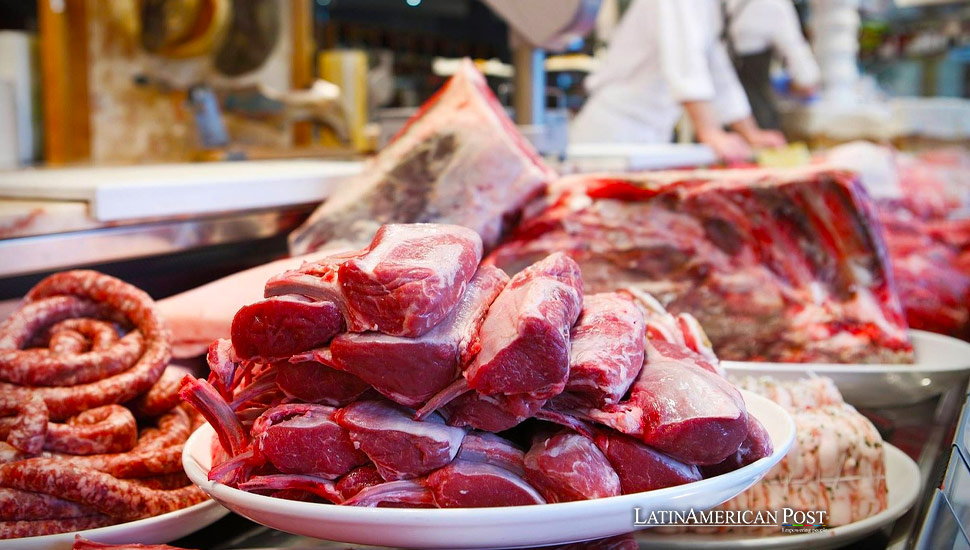Economic Crisis Forces Argentines to Cut Back on Beloved Beef

As Argentina faces severe economic challenges, the country’s iconic beef consumption is expected to hit a record low this year, reflecting broader shifts in dietary habits and economic pressures.
Beef-loving Argentines are cutting back on their steaks as the country’s economy slumps, meaning cattle consumption will likely hit a record low this year, a market report published on Friday showed. Argentina’s beef consumption in 2024 is expected to total around 44.8 kg (98.77 lb) per person, the lowest since record-keeping began in 1914, according to the Rosario exchange, which publishes market updates for grains and livestock. The historical average is nearly 73 kg.
The South American economy, including Argentina, has been hit hard by triple-digit inflation, a recession, and rising poverty and unemployment. Libertarian President Javier Milei took office in December and has rolled out austerity measures to reign in government spending. He also ended the previous government’s freeze on beef prices. Argentina, like many other Latin American countries, is famed for its beef-eating culture, with steakhouses, cattle ranches, and asado barbecues being a significant part of its culinary and social fabric.
Economic Struggles and Dietary Shifts
Longer-term trends show the population increasingly turns to cheaper alternatives such as chicken and pork. In 2024, the report showed that nearly 2 kg of alternative meats can be purchased for the price of 1 kg of beef. However, this year, all meat consumption is set to drop 9% from last year to the lowest since 2011, the exchange said.
The economic struggles in Argentina have forced many to reconsider their dietary choices. With triple-digit inflation, many families find it challenging to afford beef, traditionally a staple of the Argentine diet. President Milei’s economic policies, while aimed at stabilizing the economy, have further strained household budgets. The end of the beef price freeze has led to higher prices, pushing beef out of reach for many, painting a stark picture of the daily struggles faced by the Argentine population.
Exporting Beef Amid Domestic Decline
As consumption at home drops, farmers increasingly ship their beef abroad, a report from the exchange published on Friday showed. Export volumes from January to May this year are up 10% from the year-ago period. Despite eating less beef, Argentines consume much more than Americans, who chow down an average of 38 kg a year, Australians 27 kg, and Chileans 26 kg, the exchange added.
This trend towards exporting beef rather than consuming it domestically is indicative of Argentina’s broader economic challenges. Farmers, facing reduced demand at home, are turning to international markets to sustain their livelihoods. This shift has benefited the country’s export revenues but highlights the disparity between domestic consumption and global demand.
Cultural Impact and Future Prospects
Argentina’s cultural identity is deeply intertwined with its beef consumption. Steakhouses and asado barbecues are central to social and familial gatherings. The decline in beef consumption reflects economic hardships and signals a potential shift in cultural practices. As more Argentines turn to cheaper meats like chicken and pork, the traditional asado may see less prominence in Argentine society, marking a potential cultural shift in response to economic challenges.
However, the resilience of Argentine culture and its deep-seated love for beef should not be underestimated. While current economic conditions have forced a reduction in beef consumption, the long-term prospects for a return to higher levels of beef consumption remain possible if economic conditions improve. The government’s policies and their effectiveness in stabilizing the economy will play a crucial role in determining the future of beef consumption in Argentina, offering a glimmer of hope for a potential resurgence in beef consumption.
Also read: Argentina Faces Recession and Job Losses Amid Austerity Measures
Argentina’s economic crisis has led to significant changes in dietary habits, with beef consumption expected to hit a historic low in 2024. High inflation, recession, and austerity measures have forced many Argentines to turn to cheaper meat alternatives. Despite this, the country’s cultural affinity for beef remains strong, and future economic recovery could see a resurgence in beef consumption. In the meantime, Argentine farmers increasingly look to international markets to sustain their businesses, highlighting the complex interplay between domestic economic conditions and global trade dynamics.





